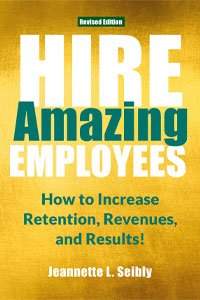
Many bosses/leaders have a budget and are looking at the next technology, sales system, or AI they can buy to build their company’s success and attract and keep customers. Sadly, they fail to provide the dollars required to train and develop their most important asset: their employees. They forget that team members are the main reason customers stay or leave.
Investing in your talent impacts your company’s results when:
- People are promoted to jobs without the necessary training and coaching for success
- Employees do not receive the proper training to support your client’s needs
- It becomes challenging to job transfer employees due to a lack of upskilling
Studies have shown that training and development improves morale and retention, attracts top talent, boosts individual and team performance, and keeps customers from straying to your competition.
Many employees today value training and development. Remember, while many technical skills need continuous upskilling, don’t overlook the essential skills of communication, critical thinking, and ethics (to name a few).
Develop the Team Members and Achieve Amazing Results
Job Fit. It starts with hiring and knowing their strengths and weaknesses based on objective data. Hiring the right person for the wrong job equals poor job fit. And no amount of training and development will make them a superstar. Poor job fit can be very costly. If that is not enough to get your attention, studies have shown it can cost over $300K per person when you hire someone who is not a good fit.
Career Pathing. Not all employees are alike! Their career path should reflect the skills required for the success of their job and accomplishing their long-term goals. This makes it easier to upskill and focus on needed training to prepare for job promotions and job transfer. Example: One top employee wanted to return to his hometown in a different state. The company paid for the transfer. However, the employee could not operate independently without the structure of the office environment. Within a year, the employee left to work for a competitor.
Personalize. Similar to the Career Pathing above, not all team members need the same training. Listening would be a better skill to develop for someone fearless in speaking up than focusing on learning how to talk in meetings. Use a qualified job-fit assessment to provide objective insights and clarify areas that must be designed to improve effectiveness.
Leadership and Management Development. Even though many employees today say they have no interest in being a boss or leader, the truth is they don’t have the training and are not given the opportunities to showcase these skills. While they may not want the job title or responsibilities, the training can be priceless in supporting them to lead teams, manage projects, and improve personal job satisfaction.
Critical Interpersonal Skills Are Crucial. Communication, critical thinking, and ethics training (to name a few) are crucial skills needed today more than ever. It requires ALL employees to develop them ongoingly. Remember, these skills can be used everywhere with anyone at any time in their lives.
Use a Mix of Training Delivery. Use podcasts, face-to-face workshops, virtual training, etc. Remember, not all people learn the same way. Ensure the trainer or presenter uses a mix of media, games, and other engaging ways to help facilitate everyone getting value.
Appreciate Progress. All bosses/leaders must acknowledge each employee and their teams for steps taken and growth observed — what you appreciate strengthens the person’s confidence and competence in using their new skills. When a skill is not used appropriately, fine-tune it with spot-on coaching to steer the employee and team forward.
Hire an Executive Coach. Everyone, especially bosses/leaders, must have an external executive coach and an internal mentor. The executive coach can provide objective insights and confidentially address issues while steering you through sticky situations and political working relationships. An internal mentor can guide your ability to work with people through industry, professional, and company silos, factions, and other political elephants.
©Jeannette Seibly 2024 All Rights Reserved
 Jeannette Seibly is a Talent Advisor/Leadership Results Coach with over 31 years of practical experience guiding leaders and bosses to improve their hiring, coaching, and managing practices and produce amazing results! And yes, achieving business success always starts with having the right people in the right jobs! She has been an Authorized PXT Select® Partner for over 32 years. Contact Jeannette to learn more about these state-of-the-art job-fit assessment tools or how to coach and manage your people to achieve incredible results.
Jeannette Seibly is a Talent Advisor/Leadership Results Coach with over 31 years of practical experience guiding leaders and bosses to improve their hiring, coaching, and managing practices and produce amazing results! And yes, achieving business success always starts with having the right people in the right jobs! She has been an Authorized PXT Select® Partner for over 32 years. Contact Jeannette to learn more about these state-of-the-art job-fit assessment tools or how to coach and manage your people to achieve incredible results.
A note from Jeannette: Are you adequately investing in your employees and teams? Many will spend more time and money on technology and overlook their people’s critical development. Need help fine-tuning your training and development efforts? Contact me!
 Now is the time to get into focused action! Are there days you dread doing what is needed to manage your people, projects, and team’s financial performance? You’re not alone! Everyone has those days! But continuing to hide behind excuses only hurts you and your future promotability. I have extensive experience and wisdom guiding bosses and leaders to hire, coach, and manage their teams successfully – this includes getting you out of the way and working with and through people effectively to achieve the results required. Contact me to learn more about my in-depth, one-on-one, customized coaching programs.
Now is the time to get into focused action! Are there days you dread doing what is needed to manage your people, projects, and team’s financial performance? You’re not alone! Everyone has those days! But continuing to hide behind excuses only hurts you and your future promotability. I have extensive experience and wisdom guiding bosses and leaders to hire, coach, and manage their teams successfully – this includes getting you out of the way and working with and through people effectively to achieve the results required. Contact me to learn more about my in-depth, one-on-one, customized coaching programs.
Are you using your talents and abilities effectively? Many of us are not! Click Here for a Free Download on how to use your talents and enjoy a rewarding career!


 Now is the time to get into focused action! Are there days you dread doing what is needed to manage your people, projects, and team’s financial performance? You’re not alone! Everyone has those days! But continuing to hide behind excuses only hurts you and your future promotability. I have extensive experience and wisdom guiding bosses and leaders to hire, coach, and manage their teams successfully – this includes getting you out of the way and working with and through people effectively to achieve the results required.
Now is the time to get into focused action! Are there days you dread doing what is needed to manage your people, projects, and team’s financial performance? You’re not alone! Everyone has those days! But continuing to hide behind excuses only hurts you and your future promotability. I have extensive experience and wisdom guiding bosses and leaders to hire, coach, and manage their teams successfully – this includes getting you out of the way and working with and through people effectively to achieve the results required. 
 Now is the time to get into focused action! Are there days you dread doing what is needed to manage your people, projects, and team’s financial performance? You’re not alone! Everyone has those days! But continuing to hide behind excuses only hurts you and your future promotability. I have extensive experience and wisdom guiding bosses and leaders to hire, coach, and manage their teams successfully – this includes getting you out of the way and working with and through people effectively to achieve the results required.
Now is the time to get into focused action! Are there days you dread doing what is needed to manage your people, projects, and team’s financial performance? You’re not alone! Everyone has those days! But continuing to hide behind excuses only hurts you and your future promotability. I have extensive experience and wisdom guiding bosses and leaders to hire, coach, and manage their teams successfully – this includes getting you out of the way and working with and through people effectively to achieve the results required. 
 Did you know your top salespeople are multipliers? According to research from McKinsey & Company, top sales performers can be 4x more productive than bottom performers. They consistently meet (or surpass) their sales targets, clearly understand their client’s needs, and adapt quickly in all situations.
Did you know your top salespeople are multipliers? According to research from McKinsey & Company, top sales performers can be 4x more productive than bottom performers. They consistently meet (or surpass) their sales targets, clearly understand their client’s needs, and adapt quickly in all situations.




 Now is the time to get into focused action! Are there days you dread doing what is needed to manage your people, projects, and team’s financial performance? You’re not alone! Everyone has those days! But continuing to hide behind excuses only hurts you and your future promotability. I have extensive experience and wisdom guiding bosses and leaders to hire, coach, and manage their teams successfully – this includes getting you out of the way and working with and through people effectively to achieve the results required.
Now is the time to get into focused action! Are there days you dread doing what is needed to manage your people, projects, and team’s financial performance? You’re not alone! Everyone has those days! But continuing to hide behind excuses only hurts you and your future promotability. I have extensive experience and wisdom guiding bosses and leaders to hire, coach, and manage their teams successfully – this includes getting you out of the way and working with and through people effectively to achieve the results required.  This book (“
This book (“